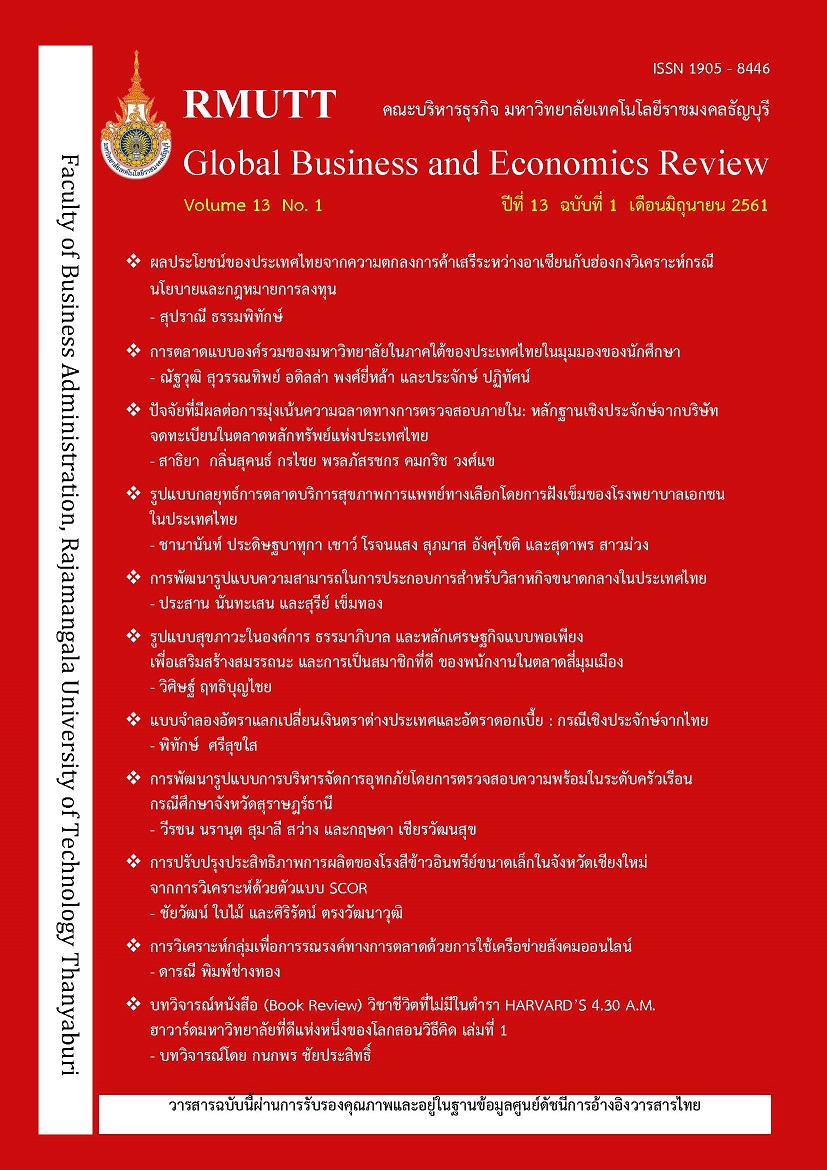DEVELOPMENT OF THE ENTREPRENEURIAL CAPABILITY MODEL ON MEDIUM ENTERPRISES IN THAILAND
Keywords:
Entrepreneurial Capability, Medium-Sized Enterprises, Market for Alternative InvestmentAbstract
The purposes of this article were: (1) to examine the influence of factors involving management skills, entrepreneurship and techniques on the entrepreneurial capability of medium-sized enterprises both registered and not registered on the Market for Alternative Investment (MAI); (2) also to analyze an entrepreneurial capability model and thence use it to compare registered and non-registered medium-sized enterprises. In this study, a mixedmethods approach involving both quantitative and qualitative phases of research investigation was employed. In the quantitative phase of investigation, germane data were collected from a total sample of 483 medium-sized enterprises both registered and not registered on MAI through the employment of survey questionnaires. In the qualitative phase of inquiry, data were collected from in-depth interviews with parties from 12 medium-sized enterprises both registered and not registered on MAI. Data were analyzed by Descriptive Statistics, Structural Equation Modeling (SEM), and Content analysis. Findings are as follows: (1) factors concerning the three skills of concern—management, entrepreneurial and techniques—exerted positive direct influence on the entrepreneurial capability of registered and non-registered mediumsized enterprises. In regard to registered medium-sized enterprises, it was found that at the highest level the factor of management exerted positive direct influence. Concerning nonregistered medium-sized enterprises, at the highest level it was found that the factor of techniques exerted positive direct influence. (2) In comparing registered and non-registered medium-sized enterprises by means of applications of an entrepreneurial capability model, there were differences between registered and non-registered medium enterprises in respect to the weight of the factor of observed variables and the coefficient of determination governing prediction at the statistically significant level of .05.
References
Ahmad, N. Z., Halim, H. A., & Zainal, R. M. (2010). Is entrepreneurial competency the silver bullet for sme success in a developing nation?. International Business Management, 4(2), 67-75.
Capasso, A., Rossi, M., & Simonetti, B. (2007). Ownership structure, heterogeneity and performance, Sinergie, Rapporti di ricerca, 26, .89–99.
Cooney, T. (2012). Entrepreneurship skills for growth oriented businesses. A report for the workshop on “Skills Development for SMEs and Entrepreneurship” held in Copenhagen on 28 November 2012.
De Clerq, D., & Belausteguigoitia, R. I. (2007). Organizational commitment in Mexican small and medium sized firms: the role of work status, organizational climate, and entrepreneurial orientation. Journal of Small Business Management, 45(4), 467- 490.
Hair, J. F., Bush, R. P., & Ortinau, D. J. (2006). Marketing research: within a changing information environment (3rd ed.). New York: McGraw-Hill.
Hoyos-Ruperto M. D., Romaguera J. M., Carlsson B., & Lyytinen K. (2013). Networking: A critical success factor for entrepreneurship. American Journal of Management 13(2), 55– 72.
Huynh, T., & Patton, D. (2014). The performance of university spin-offs: the impact of entrepreneurial capabilities and social networks of founding teams during start-ups. In The United States Association for Small Business and Entrepreneurship (USASBE), Fort Worth, Texas.
Kopyakova, A. (2017). Capital structure determinants : the evidence from listed and unlisted Dutch firm. 9th IBA Bachelor thesis conference, 1-14.
Koryak, O., Mole, K. F., Lockett, A., Hayton, J. C., Ucbasaran, D., & Hodgkinson, G. P. (2015). Entrepreneurial leadership, capabilities and firm growth. International Small Business Journal, 33(1), 89–105.
Lans T, Verstegen J., & Mulder M. (2011). Analysing, pursuing and networking: Towards a validated three-factor framework for entrepreneurial competence from a small firm perspective. International Small Business Journal 29(6): 695–713.
Maduekwe, C., & Kamala, P. (2016). Performance measurement by small and medium enterprises in Cape Metropolis. South Africa. Problems and Perspectives in Management, 14(2), 43–52.
Mahadalle, A., & Kaplan, B. (2017). Entrepreneurial characteristics and competencies as determinants of corporate performance : a study on small enterprises in mogadishu, SOMALIA. International Journal of Research GRANTHAALAYAH 5(5), 243-254.
Mohammed, K., Ibrahim, H., & Mohammad Shah, K. (2017). Empirical evidence of entrepreneurial competencies and firm performance : a study of women entrepreneurs of Nigeria. International Journal of Entrepreneurial Knowledge 5(1), 1-13.
Moshin, A. M., Halim, H. A., Ahmad, N. H., & Farhana, N. (2017). Assessing the role of entrepreneurial competencies on innovation performance : a partial least squares (PLS) approach. The Journal of Business Inquiry, 16(1), 14-28.
Oyeku, O. M., Oduyoye, O., Asikhia, O., Kabuoh, M., & Elemo, G. N. (2014). On Entrepreneurial Success of Small and Medium Enterprises (SMEs): A Conceptual and Theoretical Framework. Journal of Economics and Sustainable Development, 5(16), 14-23.
Sambasivan, M., Lim, L.-Y., Rose, R. C., & Abdul, M. (2010). Venture Performance in Malaysia: Personal Initiative, Human Capital, and Competency Areas of Founding Entrepreneurs as Critical Success Factors. Journal of Small Business & Entrepreneurship, 23(3), 315-332.
Sarwoko, E., Surachman., & Hadiwidjojo, A.D. (2013). Entrepreneurial Characteristics and Competency as Determinant of Business Performance in SMEs, Journal of Business and Management, 7(3), 31-38.
Seabela M., & Fatoki O. (2014). The entrepreneurial competencies of non-business university students in South Africa. International Journal of Educational Research 6(3): 375–381.
Simons, R. (2000). Performance measurement and control systems for implementing strategy: text & cases. Prentice Hall, Upper Saddle River, NJ.
Taylor, P. (2013). The effect of entrepreneurial orientation on the internationalization of SMEs in developing countries. African Journal of Business Management, 7(19), 1927-1937.
Tehseen, S., & Ramayah, T. (2015). Entrepreneurial competencies and smes business success: the contingent role of external integration. Mediterranean Journal of Social Science 6(1), 50-61.
Yahya, A., Fatt, C., Othman, A., Rahman, I., & Moen, J. (2011). Management skills and entrepreneurial success of small and medium enterprises (SMEs) in the service sector. African Journal of Business Management, 5(26), 10410-10418.
Downloads
Published
How to Cite
Issue
Section
License
The articles published in this journal are the intellectual property of their respective authors.
The views and opinions expressed in each article are solely those of the individual authors and do not reflect the positions of Rajamangala University of Technology Thanyaburi or any of its faculty members. All components and content of each article are the sole responsibility of the respective authors. In the event of any errors, the authors shall bear full responsibility for their own work.








